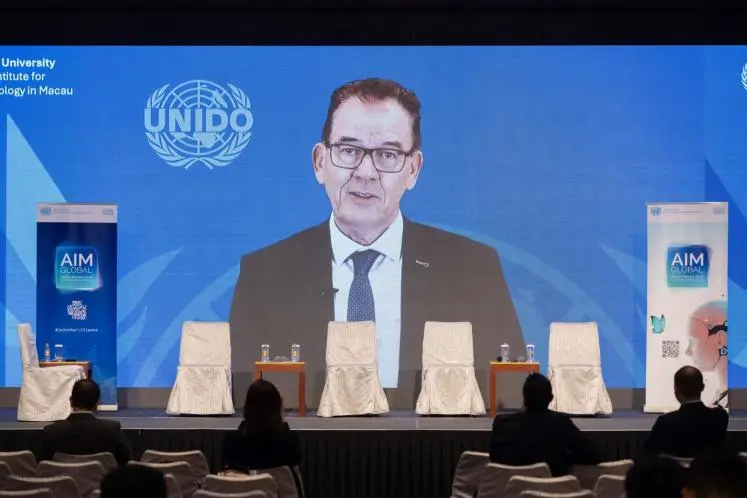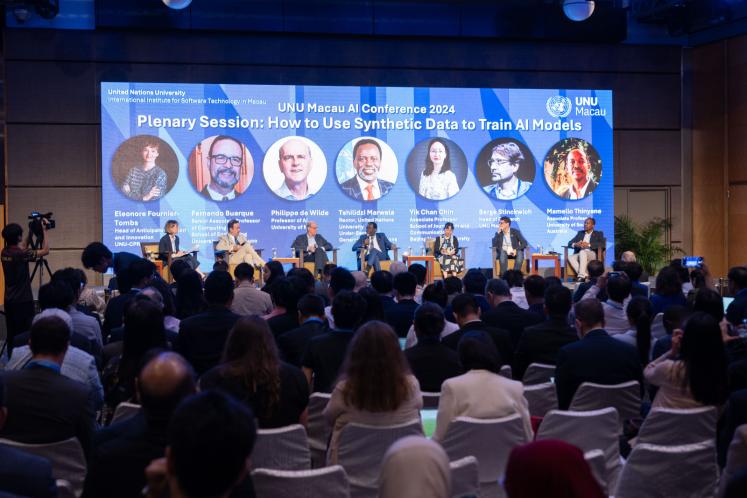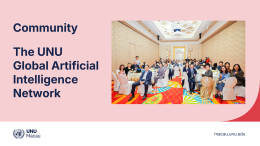The UNU Macau AI Conference 2024 is an open platform for the diverse array of perspectives and insights surrounding AI. It not only provided a place for the exchange of ideas but also served as a catalyst for reinforcing the shared stance of the United Nations (UN) on AI. Let’s hear the resonating voices echoing across the UN System.
![]() Photo: Tshilidzi Marwala / UNU Macau
Photo: Tshilidzi Marwala / UNU Macau
“AI is complex because it is how we are attempting to grapple with a planet in its full intricacy and to solve some of the biggest problems of all time. It’s time to ask the biggest questions, and to bring AI home to the material essentials of sustainable development,” articulated Tshilidzi Marwala, Rector of the United Nations University, Under-Secretary-General of the United Nations. “The next milestone in this story is the Summit of the Future”.
“Ensuring the interoperability of governance initiatives, addressing the digital divide, and fostering a multi-stakeholder approach will be essential for realizing the full potential of AI”, said Amandeep Singh-Gill, the Secretary-General's Envoy on Technology and Under-Secretary-General of the United Nations, “the Summit of the Future offers us an unprecedented opportunity to solidify our global commitment to digital cooperation.”
“While AI offers immense potential, we must ensure that governance structures are in place to ensure that AI is not used for malicious purposes and to guard against the risks that it can bring,” cautioned Guy Bernard Ryder, Under-Secretary-General for Policy of the United Nations, “It's essential that we align AI with universal human rights values and ethical principles, and that the discussion on how to do this involves multiple stakeholders.”
 Photo: Gerd Müller / UNIDO
Photo: Gerd Müller / UNIDO
“Artificial has the potential to revolutionize manufacturing processes by increasing productivity and innovation in the industrial sector, as well as optimizing resource use and reducing emissions. But we must make sure that we leave no one behind, that benefits of AI are available for all.” stated Gerd Müller, Director General of UNIDO.
“A rights-based approach not only mitigates risks such as biased or discriminatory outcomes but also paves the way for sustainable prosperity for everyone,” said Robert Opp, Chief Digital Officer at UNDP, “And privacy protection cannot merely be an afterthought. It has to be a fundamental principle embedded in every AI system.”
![]() Photo: Beate Trankmann / United Nations in China
Photo: Beate Trankmann / United Nations in China
During her remarks, UN Resident Coordinator in China (a.i.), Ms. Beate Trankmann, said, “The conversation surrounding AI governance must be a global one. The UN is particularly well positioned to help establish international consensus on the principles that make AI and digital technologies more equally accessible, preventing further expansion of the digital divide, both between and within countries.”
![]() Photo: session "A Gender Equality Perspective on Responsible AI" / UNU Macau
Photo: session "A Gender Equality Perspective on Responsible AI" / UNU Macau
In a notable session themed "A Gender Equality Perspective on Responsible AI," panelists from ITU, UN Women, UNU-CPR, UNU-IAS, and UNU Macau deliberated on the critical importance of mainstreaming women's rights and gender equality in AI development and governance. They charted actionable recommendations to address the inherent risks and opportunities of AI from a gender perspective.
The Global Forum on Data Governance and Digital Transformation, organized by the United Nations Department of Economic and Social Affairs (UN DESA), convened a delegation of 30 ICT ministers and senior officials from the Global South to bolster awareness and institutional capacities in developing national data governance frameworks, particularly in developing regions like Africa and the Asia Pacific.





